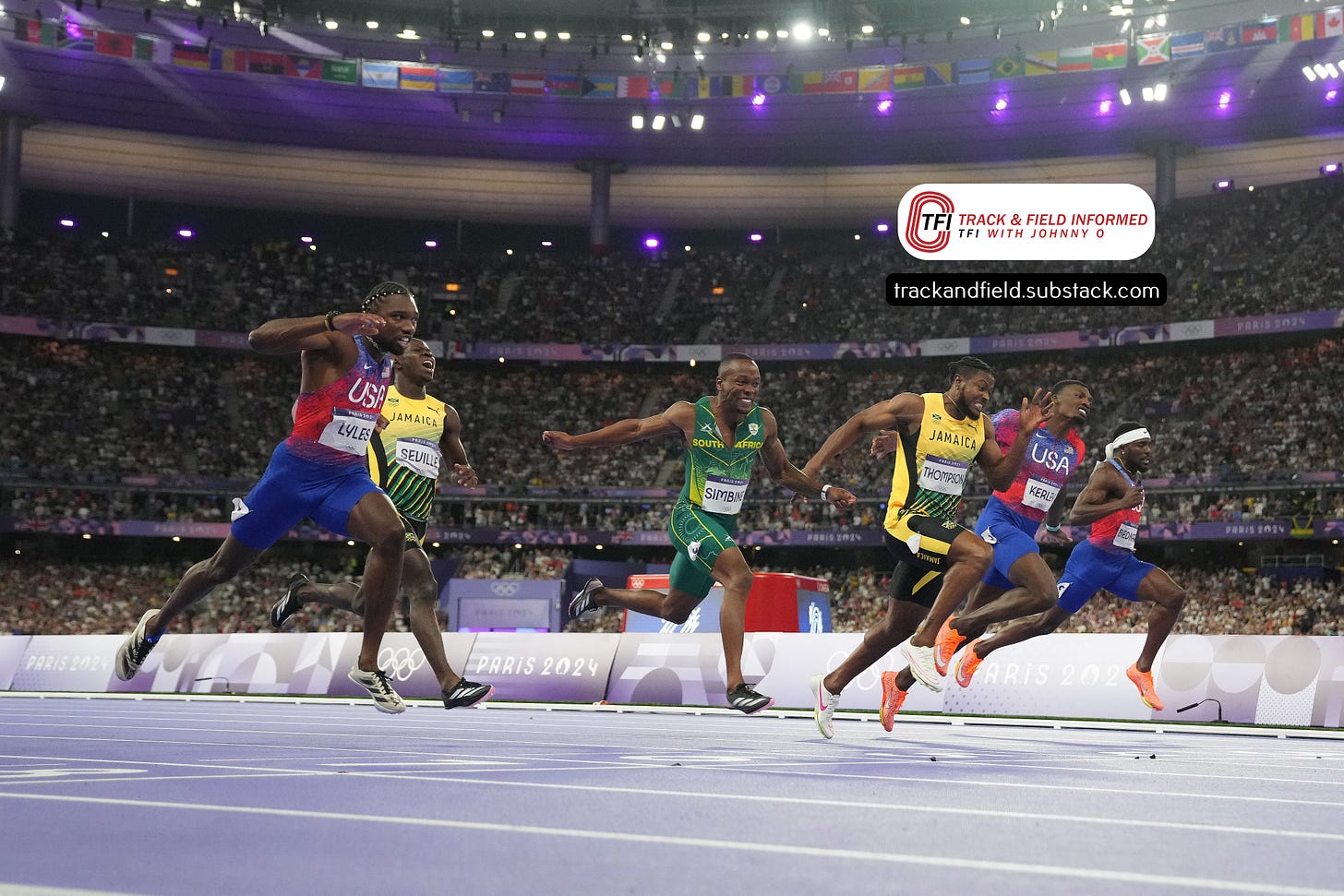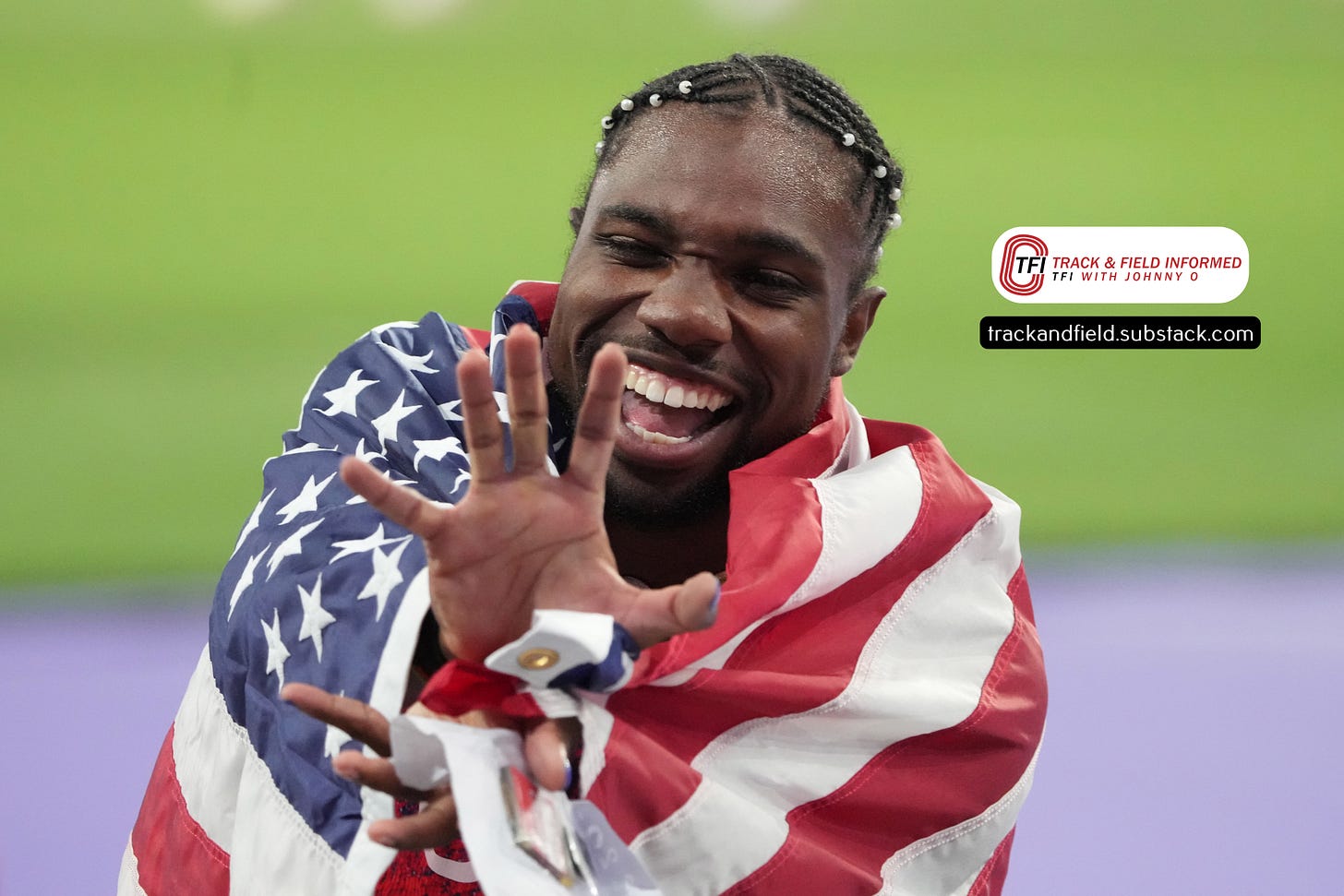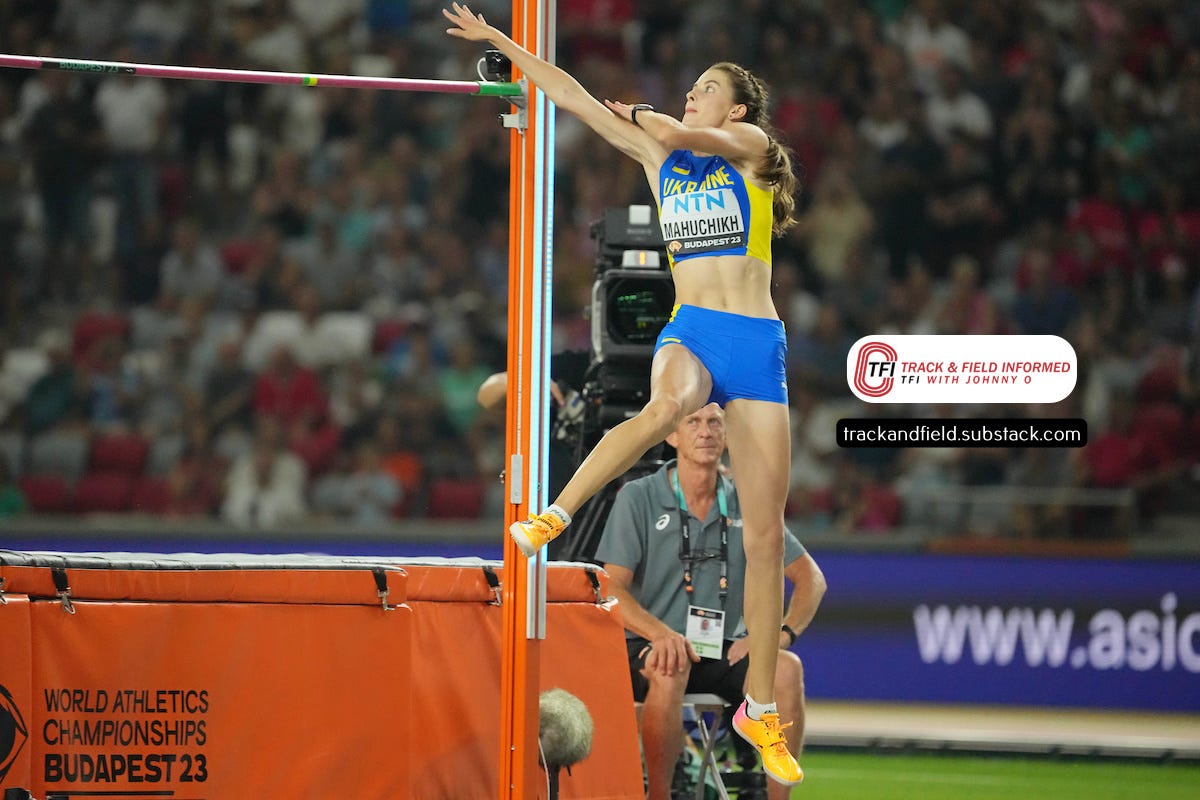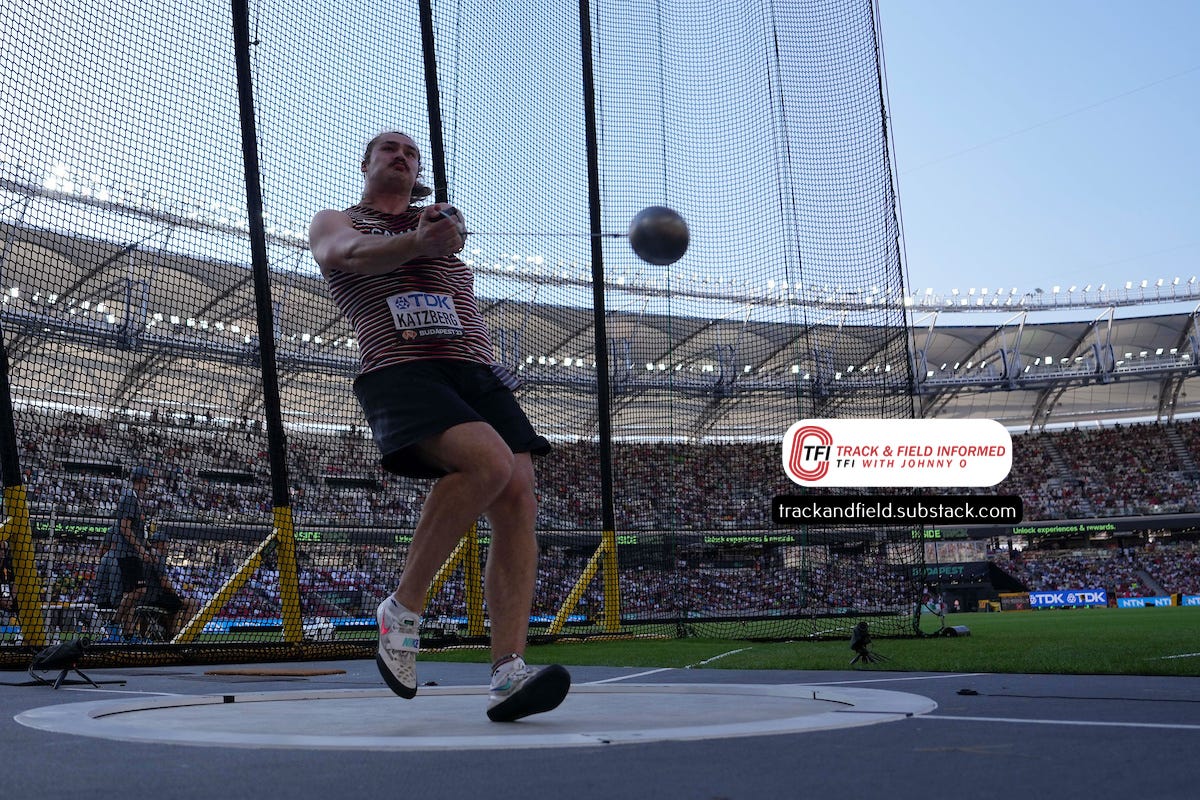Relaxed finish leads to gold medal
Lyles overcomes bad start to win historically deep and tight 100 in Olympic Games

A year ago, the book on sprinter Noah Lyles said he had to have a decent — not great, but decent — start if he was going to defeat the best sprinters in the world in the 100 meters at the global championship level. That his superior top-end speed would propel him to victory in the second half of a race as long he got off a solid start and was not required to make up too much ground on the other top competitors.
Yet he won the men’s 100-meter dash in the Olympic Games in Paris on Sunday after a poor getaway left him in no better that sixth place in the eight-sprinter field halfway through the race.
The 27-year-old Lyles won his first Olympic title because he never lost his composure and stayed relaxed during the final third of the race while first-place Kishane Thompson of Jamaica was visibly straining in his effort to cross the finish line first.
Thompson had run a personal best and yearly world-leading time of 9.77 seconds while winning the Jamaican title in late June and he and compatriot Oblique Seville had run 9.80 and 9.81, respectively, while posting the two fastest times in the semifinals earlier in the day on Sunday.
Seville, who had placed fourth in the World Athletics Championships the two previous years, looked tremendous in the first semifinal in which he glanced over at Lyles with about 20 meters left in the race as if to say, ‘I’ve got this in the bag’.
Lyles, who finished second in that semifinal in 9.83, had been at the receiving end of a similar glance in the Racers Grand Prix in the Jamaican capital of Kingston on June 1 when Seville ran 9.82 to Lyles’ 9.85. Lyles vowed back then that he would not forget that gesture and it might have given him extra motivation for the final on Sunday after it had happened again in his semifinal in front of a worldwide television and streaming audience, not to mention a stadium full of more than 70,000 spectators.
Things did not look good for Lyles after the first 50 meters of the final, but he began to eat into his deficit about 10 meters later. Nonetheless, he still trailed Thompson, fellow American Fred Kerley and Akani Simbine of South Africa 80 meters into the race. However, he edged past each of them during the next 20 meters and narrowly outleaned the powerfully-built Thompson at the wire as they were each credited with a time of 9.79, with Lyles running five thousandths of a second faster than the Jamaican.
Kerley, the silver medalist in the Olympic Games in Tokyo in 2021 and the gold medalist in the World Championships in Eugene, Oregon, in 2022, finished third in 9.81.
He was followed by Simbine in a national record of 9.82, defending Olympic champion Marcell Jacobs of Italy in 9.85, and Letsile Tebogo in a Botswanan record of 9.86.
Kenny Bednarek of the U.S. finished seventh in 9.88 and Seville was eighth in 9.91 after looking so sensational in his semifinal.
Lyles’ victory made him the first American to win the Olympic title in the men’s 100 meters since Justin Gatlin in 2004.
His time lowered his personal best of 9.81 that he had run in winning a Diamond League meet in London on July 20 and moved last year’s World champion in the 100 and 200 into a tie for 12th on the all-time performer list and tied him for sixth — with 2000 Olympic champion Maurice Greene — on the all-time U.S. list.

He will now set his sights on winning the 200, the race in which he finished a disappointing third in Tokyo.
“It’s been a rollercoaster, ups and downs,” Lyles was quoted as saying in a World Athletics post. “I’m usually a guy who likes to come out blazing in all my rounds, especially in the 200m. But the 100m, it’s my first time here on the Olympic stage.
“I think back to Tokyo when I messed up handling the rounds. From then on, I was like, ‘I’m never going to do that again. I’m going to handle this correctly and practice over the years’. It’s accumulated to this point. You only need one. As long as that’s the last one, that’s all that matters.”
Thompson said he was “super grateful. I came out here and finished injury free. I think you guys know my past issues with injuries, so I am a bit disappointed. But I am happy at the same time. I am going to take it as what it is and move forward from here.
“I wasn’t patient enough with myself to let my speed bring me at the line, in the position that I know I could have gone to, but I have learnt from it.”
The race itself was historically fast as it was the first time ever that eight men had run under 10 seconds in a contest that was not wind aided. It was also the most tightly-contested 100-meter race in the history of the Olympic Games or World Championships as the difference between the first- and eighth-place finishers was was miniscule .12 seconds.
In addition, the times for the fourth- through eighth-place finishers were the fastest ever for those places.
In the two other finals contested on Sunday, Yaroslava Mahuchikh of Ukraine won the women’s high jump and Ethan Katzberg of Canada won the men’s hammer throw.
Mahuchikh, who broke a 37-year-old world record when she cleared 2.10 meters (6 feet 10½ inches) in the Meeting de Paris on July 7, won the Olympic title by clearing 2.00 (6-6½) in the Stade de France.
Nicola Olyslagers of Australia, who defeated Mahuchikh for the World indoor title in March, also cleared 2.00, but she finished second because she needed three attempts to make that height.
Iryna Geraschenko of Ukraine and 2022 World champion Eleanor Patterson of Australia tied for third place after clearing 1.95 (6-4¾) on their first attempts and then missing three times at 1.98 (6-5¾).
Vashti Cunningham of the U.S. also cleared 1.95 on her first attempt, but she placed fifth because she had one more total miss in the competition than did Geraschenko and Patterson.
Christina Honsel of Germany also cleared 1.95, but she finished sixth because she made that height on her second attempt.
The 22-year-old Mahuchikh, who placed third in the Games in Tokyo, had won her first World outdoor title in Budapest, Hungary, last year after winning the World indoor title in Belgrade, Serbia, in 2022
Both she and Olyslagers cleared 1.91 (6-3), 1.95 (6-4¾), and 1.98 (6-5¾) on their first attempts before Mahuchikh took charge of the competition when she cleared 2.00 (6-6½) on her first attempt after Olyslagers missed her first try.

At that point, standard jumping strategy compelled Olyslagers to pass her last two attempts at 2.00 to the next height of 2.02 (6-7½), but she decided against that and was elated when she cleared 2.00 on her third and final attempt.
She then missed all three of her attempts at 2.02 while jumping before Mahuckikh, who missed her first two tries at 2.02 before passing on her final attempt at that height after she had clinched the gold medal. She then missed her remaining attempt at 2.04 (6-8¼).
Mahuchikh had burst onto the international high jumping scene when she finished second in the 2019 World Championships in Doha, Qatar, at the age of 18. But her world was turned upside down in February of 2022 when Russia launched a military invasion of Ukraine and her hometown of Dnipro is now part of a war zone.
Although she and many of her fellow Ukrainian athletes such as Geraschenko have spent most of the past two and a half years living and training outside of their home country, they have become a source of inspiration for their fellow Ukrainians.
After becoming the first Ukrainian to win the women’s high jump in the Olympic Games, she said, “Finally, I got this gold medal.”
Katzberg, who had become the first Canadian to win a World title in the men’s hammer throw last year, became the first Canuck to win an Olympic title in the event on Sunday.
He had entered the competition with a season best that was more than three meters farther than anyone else in the field and he won the gold medal for all intents and purposes when he unleashed a throw of 84.12 (275-1) in the first round.
That effort was the second best of his career behind an 84.38 (276-10) mark from earlier this season that was the best throw in the world since 2008 and moved him to ninth on the all-time performer list.
Although he fouled on four of his final five throws, his third-round effort of 82.28 (269-11) was more than two meters farther than the 79.97 (262-4) toss that gave Bence Halasz of Hungary the silver medal.
Halasz also had throws of 79.94 (262-3) and 79.82 (261-10) during a competition in which Myhaylo Kokhan of Ukraine placed third at 79.39 (260-5).
Eivind Henriksen of Norway finished fourth at 79.18 (259-9) and he was followed by five-time World champion Pawel Fadjek of Poland at 78.80 (258-6) and by Rudy Winkler of the U.S. at 77.92 (255-7).
Defending champion Wojciech Nowicki of Poland placed seventh at 77.42 (254-0) to snap a streak in which he had medaled in seven consecutive global title meets.
“Our plan was to get a good one out in the first round,” Katzberg was quoted as saying in an olympic.ca post. “For it to be 84 metres, felt really good. Definitely released some of the nerves. And then kind of after that, I still tried to go for it, and, you know, get it, get a little more out. But unfortunately, I just couldn’t, couldn’t go on tactically, but the first 84 metres felt really good.”

The semifinals of the men’s 1,500 meters and the women’s 800 topped the list of other events contested on Sunday.
Heats were also run in the men’s 400 and 110 high hurdles, and in the women’s 200, 3,000 steeplechase, and 400 hurdles.
There was also qualifying in the men’s long jump and in the women’s hammer throw.
In the men’s 1,500, the two semifinals were won by defending champion Jakob Ingebrigtsen of Norway and by Yared Nuguse of the U.S.
Ingebrigtsen took the lead after the first 400 meters of the first semifinal while on his way to a 3:32.38 clocking. He was followed by defending World champion Josh Kerr of Great Britain, who finished second in 3:32.46, and Cole Hocker of the U.S., who placed third in 3:32.54.
Nuguse took the lead early in the second semifinal and he and fellow American Hobbs Kessler finished first and second, respectively, in times of 3:31.72 and 3:31.97. Neil Gourley of Great Britain placed third in 3:32.11.
The top six finishers in each semifinal advanced to the final that will be run on Tuesday.
The three semifinals of the women’s 800 were won by pre-meet favorite Keely Hodgkinson of Great Britain, World outdoor champion Mary Moraa of Kenya, and World indoor champion Tsige Duguma of Ethiopia.
Moraa timed 1:57.86 in the first semifinal and the second automatic qualifying spot went to Worknesh Mesele of Ethiopia in 1:58.06.
Hodgkinson displayed a powerful, but controlled, homestretch kick in clocking 1:56.86 in the third semifinal in which Prudence Sekgodiso of South Africa finished second in 1:57.57.
Duguma ran a personal best of 1:57.47 in the second semifinal after coming through the first 400 meters in 56.71 seconds and 600 in 1:26.89. Shafiqua Maloney of Saint Vincent and the Grenadines placed second in a national record of 1:57.59 and Juliette Whittaker of the U.S. and Renelle LaMote of France grabbed the other two spots in the final by finishing third and fourth, respectively, in times of 1:57.76 and 1:57.78.
Jeema Reekie of Great Britain, who had run 1:55.61 while finishing second to Hodgkinson in the Diamond League meet in London on July 20, finished a non-qualifying fifth in 1:58.01 after fading badly in the home straightaway.
The six first-round heats of the men’s 400 produced some surprisingly fast performances as Americans Michael Norman and Quincy Hall won the second and fourth heats with times of 44.10 and 44.28, respectively.
The heat Norman won had superb depth as Ammar Ismail Yahia Ibrahim of Qatar finished fourth in 44.66 and Sean Bailey of Jamaica was fifth in 44.68, yet they will have to run in a repechage race on Monday because only the top three finishers in each heat automatically advanced to the semifinals on Tuesday.
The other heat winners were Muzala Samukanga of Zambia in 44.56, Matthew Hudson-Smith Great Britain in 44.78, Kirani James of Grenada in 44.78, and Charles Dobson of Great Britain in 44.96.
Steven Gardiner of the Bahamas, the defending Olympic champion and the 2019 World champion, did not run in the fourth heat that was won by Hall.
Gardiner, who had won all four of his 400-meter races this season, had missed the 2022 World Championships with an injury and he had pulled up in the semifinals of last year’s global title meet
Grant Holloway of the U.S. continued his stellar season in the men’s 110-meter high hurdles by winning his first-round heat in 13.01 seconds.
Holloway, who had run 12.92, 12.96, and 12.86 in the three rounds of races in the U.S. Olympic Team Trials in late June, ran more than two tenths of a second faster than anyone else in the first round.
The other four heats were won by Rachid Muratake of Japan in 13.22, Jason Joseph of Switzerland in 13.26, Louis Francois Mendy of Senegal in 13.31, and Zhuoyi Xu of China in 13.40.
Defending champion Hansle Parchment of Jamaica ran 13.43 to finish fifth in the heat won by Xu to advance to the semifinals on Wednesday as a time qualifier.
The top three finishers in each of the five heats automatically advanced to the semifinals, with another three hurdlers who did not place among the top three in their respective heat moving on based on their times.
Freddie Crittenden, who had run a personal best of 12.93 in finishing second to Holloway in the U.S. Trials, jogged to an 18.27 clocking to finish eighth in the second heat as he recently suffered an injury in training and figured it made more sense to run hard in a repechage race on Tuesday, rather than in a first-round heat on Sunday.
Americans Gabby Thomas, Brittany Brown, and McKenzie Long won three of the six first-round heats in the women’s 200 meters.
Thomas, the yearly world leader with a time of 21.78 seconds, clocked 22.20 in her heat with Brown running 22.38 and Long timing 22.55.
Julien Alfred of Saint Lucia, who had posted a runaway victory in winning the women’s 100 on Saturday, won her heat of the 200 in 22.41.
Daryll Neita Great Britain, who had finished fourth in the 100, took her heat in 22.39.
Favour Ofili of Nigeria was the other heat winner with a time of 22.24.
Perhaps the biggest news related to the women’s 200 was the withdrawal of Shericka Jackson of Jamaica, who had previously bypassed the 100 in order to focus on the longer race in which she is the second-fastest performer in history at 21.41 and the winner of the last two World titles.
The three heats of the women’s 3,000-meter steeplechase were won by defending champion Peruth Chemutai of Uganda in 9:10.51, reigning World champion Winfred Mutile Yavi of Bahrain in 9:15.11, and world record-holder Beatrice Chepkoech of Kenya in 9:13.56.
Faith Cherotich of Kenya, Valerie Constien of the U.S., and Alice Finot of France were some of the other runners who advanced to the final on Tuesday by finishing in the top five finishers in their respective heats.
Cherotich, the bronze medalist in last year’s World Championships, ran 9:10.57 to place second to Chemutai in the first heat.
Constien, the winner of the U.S. Olympic Team Trials in 9:03.22, placed third in 9:16.33 in the second heat that was won by Yavi.
Finot, who placed fifth in last year’s World Championships, finished second in 9:14.78 in the third heat that was won by Chepkoech.
Sydney McLaughlin-Levrone of the U.S. and Femke Bol of the Netherlands, the two fastest performers in history in the women’s 400 hurdles, were two of the five heat winners in the first round of that event.
McLaughlin-Levrone, who lowered her world record to 50.65 in winning the U.S. Olympic Trials on June 30, won the fifth of five heats in 53.60.
Bol, who lowered her best to 50.95 in a meet in Switzerland on July 14, ran 53.38 in the third heat.
The other heat winners were Americans Jasmine Jones in 53.60 and Anna Cockrell in 53.91, and Jamaican Rushell Clayton in 54.32.
Kemi Adekoya of Bahrain, who placed fourth in last year’s World Championships, was a scratch from the first heat.
The top three finishers in each of the five heats advanced to the semifinals on Tuesday, with another three hurdlers who did not place among the top three in their respective heat moving on based on their time.
Defending Olympic champion Miltiadis Tentoglou of Greece topped the list of 12 qualifiers for the final of the men’s long jump on Tuesday.
Tentoglou leaped 8.32 (27-3½), with the Nos. 2-5 qualifiers being Radek Juska of Czechia at 8.15 (26-8¾), 2022 World champion Jianan Wang of China at 8.12 (26-7½), Simon Ehammer of Switzerland at 8.09 (26-6½), and Filip Pravdica of Croatia at 8.04 (26-4½).
Tajay Gayle of Jamaica was a notable non-qualifier as the 2019 World champion and bronze medalist in last year’s meet finished 19th at 7.78 (25-6¼).
Krista Tervo of Finland set a national record of 74.79 (245-4) in the women’s hammer throw to lead the list of 12 qualifiers for the final of that event on Tuesday.
Defending World champion Camryn Rogers of Canada was the No. 2 qualifier at 74.69 (245-0) and she was followed by Americans DeAnna Price at 73.79 (242-1) and Annette Nneka Echikunwoke at 73.52 (241-2), and by Norwegian Katrine Koch Jacobsen at 73.04 (239-7).
Anita Wlodarczyk of Poland, the three-time defending Olympic champion, garnered the 12th — and final — qualifying spot with a best of 71.06 (233-1).
Woldarczyk, who has been slowed by injuries the two previous seasons, has also won four World titles during her illustrious career.
The four finals to be held on Monday are the men’s pole vault and the women’s 800, 5,000, and discus.
You can click here for a daily schedule of events, as well as start lists and up-to-date results.



